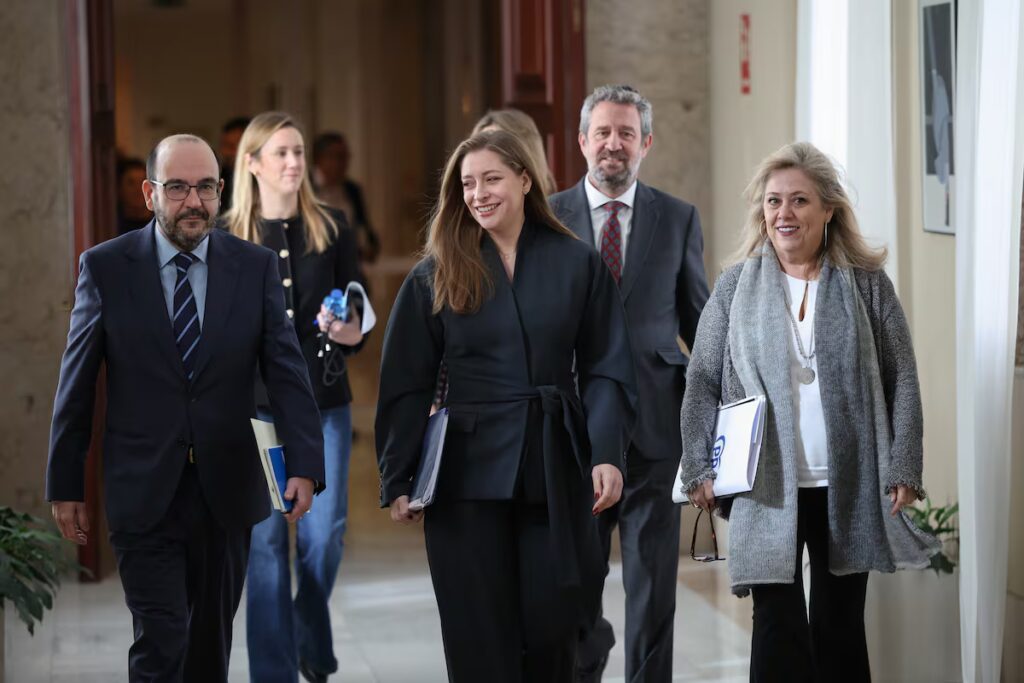
The profile chosen by the Government to fill the position of State Attorney General, Teresa Peramato – a public prosecutor with a 35-year career, closely linked to the fight against gender violence and current head of the Criminal Section of the Prosecutor’s Office of the Supreme Court – has not made it easy for the PP to exercise harsh criticism as anticipated on Monday itself by its leader, Alberto Núñez Feijóo. The People’s Party, accustomed to firing relentlessly at any decision of Pedro Sánchez’s executive, were forced to slow down and even praise Peramato’s “exemplary curriculum”. However, the PP has also expressed its “caution” and doubts, because it is a “continuing” prosecutor from the era of Álvaro García Ortiz and Dolores Delgado and because it wants to know if he will bow to the interests of La Moncloa, as they believe the previous attorney general did. The executive partners liked her feminist profile.
The popular ones had to recognize Peramato’s curriculum and career, linked to the fight against sexist violence, just when this Tuesday the day against gender violence is celebrated. “What I know about Ms. Peramato is due to her experience in defending women victims of sexist violence and, in this sense, her role has been exemplary,” the PP’s deputy secretary for equality, Jaime de los Santos, admitted to La Sexta early in the morning. De los Santos stressed that Peramato has spent “more than three decades of work holding different responsibilities as a public prosecutor,” although he made it clear that “now it is time that he does not bow to the interests of Pedro Sánchez, as García Ortiz did, and does not become simply another minister.”
Despite Peramato’s past, the PP is wary of any decision that comes from Pedro Sánchez, so immediately afterwards the People’s Party also underlined that this prosecutor’s proposal “continues”, because the prosecutor “Dolores Delgado and García Ortiz enjoy absolute trust”, underlined the parliamentary spokesperson of the PP, Ester Muñoz. Peramato was promoted to the category of House prosecutor and appointed by the then state attorney general, Dolores Delgado, as House prosecutor against violence against women, a position in which she remained until 2025. “We are what we do,” concluded Muñoz, with a somewhat skeptical but cautious tone.
The Popular Party therefore welcomes the nomination proposal with “caution”, waiting to know whether “Sánchez has decided to give up continuing to politicize the State Attorney General’s Office or whether he will continue to use it to his advantage”, added the general secretary of the PP, Miguel Tellado. “We will welcome this nomination with the utmost caution because the important thing is to know whether Sánchez will continue to believe, despite the conviction, in the State Attorney General; and whether he will continue to use his power of attorney politically, as he did when the prosecutor was Álvaro García Ortiz, his prosecutor, as he himself recognized,” he underlined number two of Feijóo. “So be careful. The important thing is not who they nominate, but who nominates them,” insisted Tellado. The important thing, the PP believes, is “whether (Sánchez) learned the lesson after the Supreme Court conviction”.
Executive members liked the appointment and, above all, Peramato’s progressive and feminist profile and career. Sumar’s spokesmen in Congress supported the election to replace Álvaro García Ortiz as head of the state Attorney General’s Office. The spokeswoman for Yolanda Díaz’s party in the Chamber, Verónica Martínez, opened her press conference by “welcoming” the news. “We trust that she will do a good job leading the institution,” he stressed, noting that “in addition to being a prosecutor of proven solvency, she is committed to feminism and equality.”
Also from Sumar, Compromí spokesperson Alberto Ibáñez underlined that Peramato “has a brilliant track record in the defense of human rights, in particular women’s rights”, and that it “condemns the genocide in Gaza”. Ibáñez underlined that all this “supports” her as head of the Prosecutor’s Office. The spokesperson of Más Madrid in the Chamber, Tesh Sidi, also appreciated that Peramato is “a progressive and feminist woman”. “It is an ideal proposal, with vast experience, more than 35 years,” he insisted, before arguing that “putting this prosecutor with vast experience in gender violence” is “a strong response”.
Podemos’ spokesperson in Congress, Ione Belarra, avoided taking stock of the career of Teresa Peramato, the government’s candidate to replace Álvaro García Ortiz as head of the State Attorney General’s Office. “Regardless of the specific person who will hold the position, the question is whether or not the Socialist Party will fight against the coup in Spain,” he said. Belarra insisted on his thesis that Podemos was “the only political force” that claimed that “all judicial power was handed over to the right”. Naturally he asked the Government to adopt “concrete measures for access to the judicial career, for the elimination of capacity constraints and for the renewal of the General Council of the Judiciary (CGPJ)”. “This is where we are risking the possibility of Spain having a stronger democracy in the coming years or continuing down this path of reactionism and reduction of rights,” he concluded.
The leader of Vox, Santiago Abascal, refused to grant a margin of confidence to the new attorney general not so much because of his profile but because his appointment corresponds to the Government. In public mirror, of Antena 3, Abascal also avoided evaluating his professional career, arguing that the President of the Government, “who is fleeing from Justice and depriving Spaniards of the possibility of expressing themselves at the polls, will not take any decision, including this appointment, to put himself at risk. Frankly, I think we must be very cautious.” Abascal criticized the fact that the president of the PP, Alberto Núñez Feijóo, asked that the election of the new prosecutor have the approval of the CGPJ and recalled that its composition was agreed between popular and socialists.





